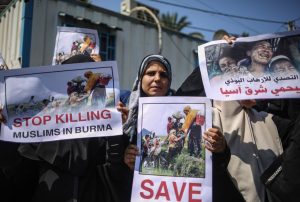Mis-labelling & persecution: Is Myanmar’s approach to Rohingyas dreadfully familiar?

A protest in Gaza on September 10 this year against Myanmar’s treatment of Rohingya Muslims (Photo by Ali Jadallah/Anadolu Agency/Getty Images)
Someone sent me a link the other day to a Haaretz news report about Israel’s continued arms supplies to Myanmar. It seemed to me that my interlocutor felt a deep (if unstated) horror at Israel’s impunity. For, Tel Aviv appeared wholly undeterred by Myanmar’s violent persecution of the Rohingya. Certainly it saw no reason to halt weapons sales to Yangon.
In fact, that’s not even the half of it. Israel may have provided a template of sorts to Myanmar. There’s been a twinning – of mindset and approach – between Israel and Myanmar from their earliest days as independent countries.
Both won independence in 1948 and from early on, as Palestinian journalist Ramzy Baroud points out, Israel’s most “high-profile” leaders “felt compelled to visit” the country then called Burma, he writes. Burma’s early Israeli visitors included Shimon Peres, Moshe Dayan, Yitzhak Ben-Zvi, David Ben-Gurion and Golda Meir. At the time, writes Mr Baroud, “the Myanmarese government was convinced that ‘Israel was the quintessential example of the egalitarian social and economic order that [it] wished to establish”.
Might that have helped the Burmese fashion an insidious and untrue narrative about the Rohingya? It was somewhat similar to Israel’s story that denied Palestinians “any historical link to their homeland”, in Mr Baroud’s words.
What this conferred was a debilitating sort of statelessness. Nadia Elia, Diaspora Palestinian scholar, also makes the link between Myanmar’s official position on the Rohingya, whom it stripped of citizenship in 1982 and Israel’s description of Palestinians.
Myanmar says the Rohingya are originally from Bangladesh and it refers to them as “Bengalis”. The Rohingya clearly did not make the cut to be citizens, or a member of Myanmar’s so-called national races, which is to say people whose ancestors had a documented presence in the country before 1823. From, 1824, the Anglo-Burmese wars began; by the mid 1880s, the British were in control.
Ms Elia writes that Israel tried to categorise the Palestinians as “southern Syrians” (as Golda Meir put it) or “Jordanian”. It prefers to call them “‘Arab’ rather than Palestinian …[and uses] a two-tier system of citizenship, whereby only Jews are ‘nationals’ while non-Jews can be ‘citizens’, with a different and unequal set of rights.”
Sound familiar?
But the twinned approach goes beyond mis-labelling. There is a dreadful familiarity too about Myanmar’s treatment of the Rohingya Muslims, says Ms Elia. It’s pretty much like Israel’s behaviour towards the Palestinians. “Myanmar’s attacks, launched on 26 August, are described as a ‘response’ to attacks by Rohingya militants on 25 August. [It was] uncomfortably reminiscent of Israel’s murderous assaults on an entire population, in response to rocket attacks from the Gaza Strip that, in most cases, fizzle harmlessly across an illegal border.”
Israel’s responses to Palestinians actions large and small are often “disproportionate”, she writes. There is “collective punishment of entire families”. And there’s “the genocidal blockade on the Gaza Strip in response to the outcome of democratic elections that were not to Israel’s liking.”
The weaponisation of difference. Is that, even more than weapons to Yangon, Israel’s contribution to the Rohingya cause?

